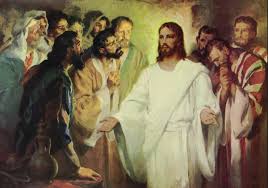HOMILY THURSDAY of the EASTER OCTAVE
Witnessing Through Faith, Forgiveness and Fulfillment
(Acts 3:11-26; Ps 8; Lk 24:35-48)
*************************************************
On this fourth day of the Octave of Easter, the readings continue to merge together Pentecost and Easter – the giving of the Spirit and its aftermath, and the resurrection of Jesus and the aftermath of that momentous event.
It is as if it is impossible to take in the full impact of the resurrection without also including the reality of its completion in the coming of the Spirit of the Risen Jesus at Pentecost.
The first reading and gospel mirror each other, calling us to witness through faith in Jesus, forgiveness of our sins and the fulfillment of all prophecies.
In the first reading from Acts, Peter has just witnessed the power of the Spirit of the Risen Jesus, and faith in the name of Jesus, heal a man born lame. Peter addresses the crowds that gather in amazement, wonder and astonishment, and tries to explain what is happening. God has raised Jesus from the dead, and Peter’s witness to that is a call to believe, as all the prophecies about Jesus are fulfilled.
That faith should lead us to repentance, to receive the forgiveness of Jesus for all our sins and transgressions. That forgiveness and healing leads to our restoration and renewal that in turn leads to faithful participation in our covenant relationship with God.
 The Gospel takes us back to the appearance of Jesus to the gathered disciples in Jerusalem, where he reassures them of the reality of his rising to new life – inviting them to touch his wounds and even eating broiled fish. He speaks again to them of prophecies fulfilled in him, the need for him to suffer and rise from the dead for the forgiveness of sins. That Good News is now to be proclaimed to all nations, beginning from Jerusalem.
The Gospel takes us back to the appearance of Jesus to the gathered disciples in Jerusalem, where he reassures them of the reality of his rising to new life – inviting them to touch his wounds and even eating broiled fish. He speaks again to them of prophecies fulfilled in him, the need for him to suffer and rise from the dead for the forgiveness of sins. That Good News is now to be proclaimed to all nations, beginning from Jerusalem.
Realizing there is too much here to take in all at once, let us focus on just a few details. From both readings, we learn that the resurrection is all about forgiveness, and a universal restoration that would come through faith in Jesus.
The Good News here is that in Jesus’ death and resurrection, we are forgiven every sin we have ever committed and will commit. What is important is that we repent and open ourselves up to receive his forgiveness and healing, or transformation. Then we are to do what he has done, forgive from the heart anyone who has hurt us in any way (“Love one another as I have loved you”). When we are able to both receive his forgiveness, and forgive others as he forgave us, then we are being transformed into his likeness.
Another way of putting this is that when we act like God, we get to feel like God. On the cross, Jesus was at peace, because he knew he was doing the Father’s will – revealing to the world the depth of the Father’s love and who God really was – humility, mercy, compassion, unconditional love, forgiveness and total non-violence.
For victims of sexual abuse especially, when they forgive their abusers from the heart through the power of the Spirit of the Risen Lord, their innocence comes back, their dignity comes back, their self worth comes back, because they are just like Jesus on the Cross and it does not get better than that. They are already participating in the “universal restoration” that Peter promises in the first reading.
On Wednesday of the Octave of Easter one year, I went to Bowden Institute near Red Deer to baptize two and confirm three inmates who had been well prepared over eight months by a team of catechists. It was an amazing celebration of faith in the Risen Lord, as they were fully initiated into the Church in the presence of about 50 fellow inmates, chaplains, family members, catechists, sponsors and volunteers. We made do with what we could (they could not keep the candles, and my camera was not allowed as it was not pre-authorized, so no pictures). That did not dampen their spirit. Joy was the one word that captured this event. One of the catechists shared how she was brimming over with joy and a sense of fulfillment at having journeyed with the candidates over the past year. This truly was a participation in that universal restoration Peter speaks about.
The Eucharist at that event took on even deeper meaning as the gospel was about the Emmaus account, where Jesus took bread, blessed it, broke it and gave it to the disciples – and at that instant they recognized him, as we did during the celebration.
We also realized how each Eucharist is a re-living of the Emmaus event (Jesus listens to us – the penitential rite; we listen to him – the Liturgy of the Word; we recognize him – the consecration and communion, and we return to Jerusalem with hearts burning – the dismissal).
So let us place our faith in the name of Jesus, open ourselves to receive his forgiveness, be grateful for all prophecies fulfilled, and share this great Good News with others in our lives as did Peter.



